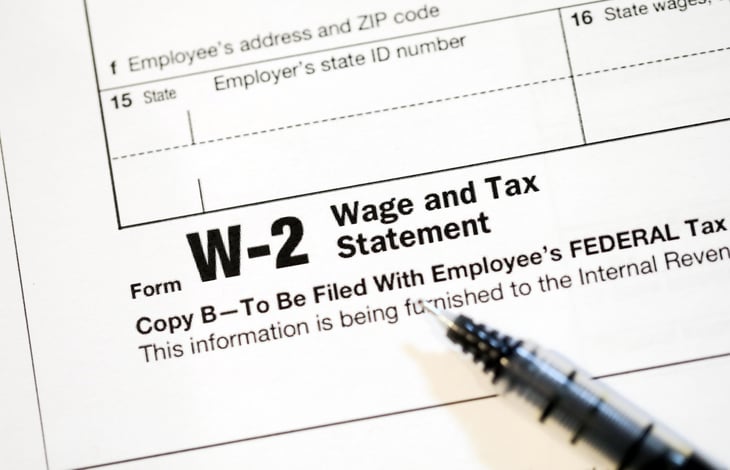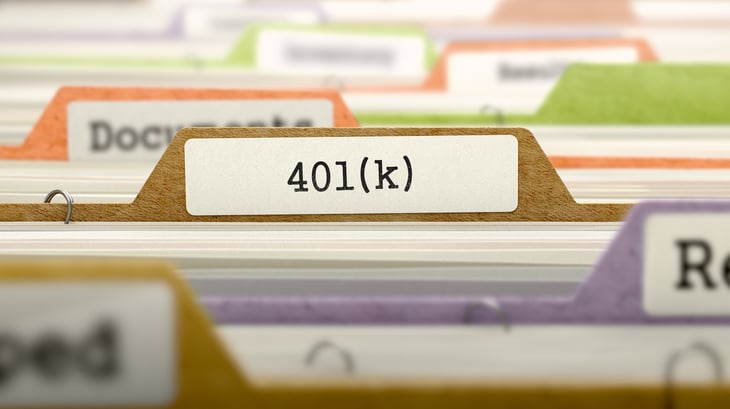
Whether you prepare your taxes online using software or plan to meet with a qualified tax professional, make sure you have the right documents on hand.
The IRS typically gets a copy of every form in this article so it’s important that the information that you or your tax pro enters on your tax return matches what’s on your other tax-related forms that go to the IRS.
Here’s a list of the most important documents you might need to file your Form 1040 U.S. Individual Income Tax Return for 2023, which is due by April 15, 2024, for most taxpayers.
1. Form W-2

Form W-2 Wage and Tax Statement lists an employee’s income and withholdings from the previous year. If you had more than one employer, though, you’ll need a W-2 from each one.
Most employers have a copy of your W-2 online, and companies are required to mail out W-2s by Jan. 31.
2. Form W-2G

If you happened to get lucky at the slot machines or through other gambling last year, you likely received a Form W-2G Certain Gambling Winnings from the casino. That’s because you are required to report such income on your federal tax return.
Even if you won money gambling but didn’t receive a W-2G, the IRS requires you to report that income on your tax return.
If you lost money gambling, you can deduct the losses up to the amount of your winnings as an itemized deduction. For example, if you won $2,000 and lost $1,000, you could deduct that $1,000 loss, but if you won $2,000 and lost $3,000, you could only deduct $2,000 of the loss (since your winnings were limited to $2,000).
But again, this is an itemized deduction. That means only taxpayers who itemize their tax deductions, as opposed to claiming the standard deduction, can write off gambling losses.
3. 1099 forms for earned income

There are multiple types of 1099 forms, which provide information on different types of incomes that are reported to the IRS.
Types of 1099 forms that you might receive for earned income, meaning income you made by working, can include:
- 1099-NEC Nonemployee Compensation: If you have your own business or work for another company as a contractor, not an employee, this form lists the income you earned from the companies or individuals you worked for.
- 1099-K Payment Card and Third Party Network Transactions: This form is for people who accept payments for goods or services by credit card or use a third-party network, such as if you resell things on eBay or drive for Uber or Lyft to bring in extra income. Small-business owners, freelancers and other gig workers who received more than $20,000 in payments or processed more than 200 transactions in 2023 should expect this form from each of the platforms they use.
It’s important to note that all income is taxable even if you did not receive a 1099, and the IRS expects you to report it: “[T]he legal requirement for reporting income has not changed,” the agency said in a fact sheet about Form 1099-K issuance.
4. Expense documentation for 1099 earned income

Under current tax law, employees — that is, workers who receive a Form W-2 — cannot deduct unreimbursed work expenses, such as uniforms or union dues. But workers who receive a Form 1099 can deduct eligible expenses associated with their 1099 income.
For example, costs for supplies, marketing, tools or materials used in your business are deductible and will be reported on a Schedule C, so it’s important to keep records of such expenses. If you drive in the course of your business, you’ll need a detailed record to claim the standard mileage rate, which is 62.5 cents per mile driven in 2023.
5. Other types of 1099 forms

Here are a few of the most common 1099 forms you might receive for unearned income, which is often taxable:
- 1099-B Proceeds From Broker and Barter Exchange Transactions: If you sold securities or investments last year, the income you received will be reported here. Barter exchanges might be listed here too.
- 1099-C Cancellation of Debt: This form reports debt that has been settled and paid for less than the original amount owed, like a credit card debt or personal loan.
- 1099-DIV Dividends and Distributions: This form reports dividends or income you received on investments held with banks or other financial institutions.
- 1099-G Certain Government Payments: If you were out of work and received unemployment income last year or if you received a state refund or government offset last year, you’ll receive this form.
- 1099-INT Interest Income: Any interest you received that totals $10 or more is reported on this form. This may include interest you’ve earned on savings accounts, certificates of deposit or any savings bonds you’ve redeemed.
- 1099-MISC Miscellaneous Income: This form is for types of income that don’t have a dedicated 1099 form, like prize money, rental income or awards of at least $600.
- 1099-R Distributions From Pensions, Annuities, Retirement or Profit-Sharing Plans, IRAs, Insurance Contracts, etc.: Once you begin receiving retirement income from a pension, a workplace plan like a 401(k) or your individual retirement account (IRA), you’ll receive a 1099-R with the amount withdrawn. Be sure to confirm the reason you took out the funds by looking at the distribution code, found in Box 7. This code indicates whether you took the funds out early and may be subject to a penalty. Form 1099-R may look a little different if you were in the military or worked for the federal government.
- 1099-S Proceeds From Real Estate Transactions: If you sold a home or other real estate last year, the details of that sale will be reported on this form.
6. 1099 forms for Social Security or railroad benefits

If you’re receiving Social Security benefits, you’ll receive a Form SSA-1099 or Form SSA-1042S. This annual benefit statement will show the total amount of benefits you received for the prior year. If any of your benefits were withheld to cover federal income taxes or Medicare premiums, those totals will be on the form as well.
Form SSA-1099 is usually mailed out in January. If you can’t find yours, you can always get a copy through your online Social Security account.
If you receive benefits from the U.S. Railroad Retirement Board (RRB), however, you may receive Form RRB-1099 instead. As is the case with Social Security benefits, a portion of your railroad benefits may be taxable. But it’s on you (or your tax pro) to determine if you owe taxes on RRB benefits.
7. 1098 forms

There are multiple types of 1098 forms, which provide information on other types of financial transactions. In some cases, you may be able to deduct the amounts reported on some of these forms.
Types of 1098 forms include:
- 1098 Mortgage Interest Statement: Mortgage companies will report your interest payments on this form if you paid $600 or more last year. You can deduct this if you itemize your tax deductions rather than claiming the flat-amount standard deduction.
- 1098-C Contributions of Motor Vehicles, Boats and Planes: You’ll receive a 1098-C with a donation of a motor vehicle, boat or plane that has a value of more than $500. Such donations are only deductible if you itemize, however.
- 1098-E Student Loan Interest Statement: This form includes any interest paid on students loans, and the 1098-E could result in a student loan interest deduction on your federal tax return of up to $2,500 — regardless of whether you itemize or claim the standard deduction.
- 1098-F Fines, Penalties and Other Amounts: Fines and penalties or other restitution amounts that are ordered to be paid by a court are reported on this form. Most of these amounts are not tax deductible, however.
- 1098-T Tuition Statement: If you paid for any courses last year, for either yourself or one of your dependents, a 1098-T can be used to help claim an educational tax credit if you’re eligible.
8. Other helpful paperwork

Whether you do your taxes yourself at home or go to a professional, you likely will need the following information and documents on hand before starting your return:
- Social Security number: You will need a Social Security number or individual taxpayer identification number (ITIN) for any eligible person you will claim on your tax return.
- Bank account information: Remember to bring your bank’s routing number and your checking or savings account number to receive your refund electronically. If you owe the IRS money, you can make your payment by this method as well.
- Tax payments: If you paid quarterly tax payments for the 2023 tax year, you’ll need to report the amount and date paid on your tax return.
- The prior year’s tax return: Although in most cases, if you’re using the same software or tax firm as last year, your information from your prior return will pull over into your current return.




Add a Comment
Our Policy: We welcome relevant and respectful comments in order to foster healthy and informative discussions. All other comments may be removed. Comments with links are automatically held for moderation.